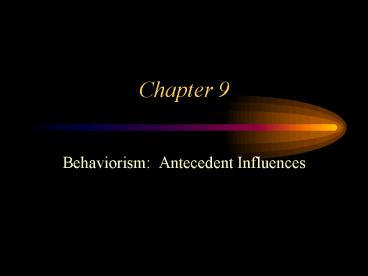Behaviorism: Antecedent Influences - PowerPoint PPT Presentation
1 / 22
Title:
Behaviorism: Antecedent Influences
Description:
Animal Psychology -- Study of animal psychology began to focus more on animal ... A common concept in modern cognitive psychology is that activation of a concept ... – PowerPoint PPT presentation
Number of Views:280
Avg rating:3.0/5.0
Title: Behaviorism: Antecedent Influences
1
Chapter 9
- Behaviorism Antecedent Influences
2
Factors that Contributed to the Emergence of
Behaviorism
- Logical Positivism -- The philosophy which argued
that all one could know is what they could
objectively observe - Animal Psychology -- Study of animal psychology
began to focus more on animal behavior than the
animal mind.
3
Edward Thorndike(1874-1949)
4
Well known for his study of trial and error
learning in cats.
5
Basic paradigm
- Cats placed in puzzle box
- Cats would engage in a variety of behaviors in
the box until one happened to open a door which
allowed the animal to escape - After repeated attempts the cat learned the
response that permitted escape.
6
(No Transcript)
7
(No Transcript)
8
Thorndikes Connectionist Theory
- Learning involves the formation of a connection
between a stimulus and a response. - Complex behaviors can be understood in terms of
stimulus-response connections.
9
Thorndikes Laws of Learning
- Law of Effect Responses followed by satisfying
consequences will be strengthened, while
responses followed by annoying consequences will
be weakened. - Law of Exercise Connections become stronger
with use, while connections become weaker with
disuse.
10
Ivan Pavlov(1849-1936)
11
Pavlov A brief personal history
- Initially studied for the priesthood
- Became fascinated by science after having read
books by Darwin and the Russian physiologist
Sechenov. - Studies physiology, receives M.D. in 1883
- Accepts a position at the Institute of
Experimental Medicine in St. Petersburg in 1895 - Awarded nobel prize in 1904 for work on digestion
12
Pavlovs work on digestion
- Develops Pavlovs pouch
- Notes digestive response to food stimuli
- Notes psychic reflexes
13
(No Transcript)
14
(No Transcript)
15
(No Transcript)
16
Pavlovs conditioning paradigm
Prior to conditioning
Food
Salivation
Bell
No response
During Conditioning
Bell Food
Salivation
After Conditioning
Bell
Salivation
17
Pavlovs conditioning paradigm
Prior to conditioning
Food
Salivation
(UCS)
(UCS)
Bell
No response
(Neutral Stimulus)
During Conditioning
Bell Food
Salivation
After Conditioning
Bell
Salivation
(CS)
(CR)
18
Conditioning Phenomena
- Extinction
- Spontaneous Recovery
- Generalization
- Discrimination
19
Explanations
- Excitation and connection
- Inhibition
- Irradiation and concentration
20
Pavlovs neurophysiology and and the notion of
semantic activation
A common concept in modern cognitive psychology
is that activation of a concept in a conceptual
network results in the activation of related
(connected) concepts. Notice the similarity to
Pavlovs notions.
21
Pavlov and Temperment
- Melancholic (depressed) -- weak in both
excitatory and inhibitory processes. - Choleric (hot-tempered) -- strong excitatory
processes - Phlegmatic (unemotional) -- strong, but equal
excitatory and inhibitory processes calm
exterior behavior. - Sanguine (cheerful) -- strong but equal
excitatory and inhibitory processes lively
external behavior.
22
Pavlov on psychology
Pavlov was critical of psychology for its failure
to rely on purely physiological explanations.































